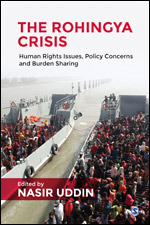Mae'r cynnwys hwn ar gael yn Saesneg yn unig.
I’ve been analysing civil society organisations’ (CSOs’) perspectives on the crisis facing an estimated one million Rohingya people, members of a Muslim minority group (a variation of the Sunni religion), that have fled persecution in the western state of Rakhine, Myanmar. This work is part of the project Trust, Human Rights and Civil Society in WISERD’s civil society research programme.
My study has been presented in a new edited collection that reveals how the Rohingya have sought sanctuary in the south-eastern district of Cox’s Bazar in Bangladesh. Yet both Myanmar and Bangladesh have denied them citizenship. As the new research reveals, they are subject to inhuman treatment, oppression, and rights denial. The cornerstone of the oppression is the refugees’ lack of legal status.
This new study covers three periods:
2004-2009: At this juncture, Bangladesh had approximately 28,000 stateless Rohingya refugees from Northern Rakhine. Since 1991 many of these have been resident in camps in the south-east of Cox’s Bazar. In addition, during this period it is estimated that a further one hundred thousand Rohingya who were not recognized as refugees were resident in Bangladesh.
2009-2013: During this period, the number of unregistered Rohingya had grown to almost a third of a million. Increasingly, they lacked protection and humanitarian aid. NGOs note a shift in the Government of Bangladesh’s response from humanitarian concern to attempts to push Rohingyas back over the border, regardless of the risk to them on return to Myanmar. It also began denying critical humanitarian assistance to its long-term Rohingya population in a bid to deter other refugees from crossing the border.
2014-present: By this point, the scale of the crisis had been transformed. The realisation of Bangladesh’s human rights commitments faced many setbacks in the face of a sudden influx of nearly one million forcibly displaced Rohingyas.
What are the key findings?
Bangladeshi agencies are swamped by the scale of the crisis and international organisations have struggled to assist. Civil society accounts give powerful testimony of the terrible conditions in the Rohingya camps. Residents fear violence and attack as authorities withdraw from the area at night, leaving them unpoliced and lawless. The COVID-19 pandemic has compounded the suffering. Moreover, the sprawling camps have caused widespread environmental devastation.
The study reveals serious human rights violations. Here are just three examples:
- Legal and international treaty failings. A fundamental and enduring problem is Bangladesh’s failure to sign the key international treaties on refugees. This effectively renders the Rohingya refugees stateless – in legal terms ‘non-persons’.
- Gender-based oppression and discrimination. In the face of widespread suffering amongst Rohingya refugees, women and girls fare particularly badly. They suffer trafficking, violence, and sexual exploitation.
- Suppression of civil society and intimidation of human rights defenders. NGOs, humanitarian actors, and human rights defenders are facing increasing repression of the rights to freedom of opinion, expression and association – as well as intimidation, harassment and violence.
The latest cruel phase in the Rohingyas’ suffering is the Government of Bangladesh’s inhumane programme, operative since December 2020, which has moved nearly 20,000 Rohingya refugees to Bhasan Char, an island in the Bay of Bengal. It has inadequate storm and flood protection. Those transported to this remote location face food shortages, unreliable sources of potable water, lack health care and schools, and severe restrictions on freedom of movement.
The full study findings are published (October 2021) in:
 Chaney, P. (2021) ‘Situated Knowledge’: Exploring Global Civil Society Views on the Rohingya Crisis’ Chapter 12 (pp. 280-305) in The Rohingya Crisis: Human Rights Issues, Policy Concerns and Burden Sharing, Edited by Nasir Uddin – SAGE Publishing, Los Angeles, London & Delhi. ISBN: 9789354791307
Chaney, P. (2021) ‘Situated Knowledge’: Exploring Global Civil Society Views on the Rohingya Crisis’ Chapter 12 (pp. 280-305) in The Rohingya Crisis: Human Rights Issues, Policy Concerns and Burden Sharing, Edited by Nasir Uddin – SAGE Publishing, Los Angeles, London & Delhi. ISBN: 9789354791307
“Rohingya refugees in the Nayapara camp” by Austcare – World Humanitarian Aid is licensed under CC BY-NC-ND 2.0

